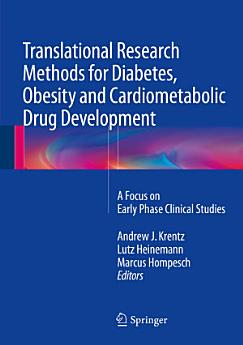Translational Research Methods for Diabetes, Obesity and Cardiometabolic Drug Development: A Focus on Early Phase Clinical Studies
Andrew J. Krentz · Lutz Heinemann · Marcus Hompesch
Nov 2014 · Springer
Ebook
312
Pages
reportRatings and reviews aren’t verified Learn More
About this ebook
The world is beset by a pandemic of obesity and type 2 diabetes and the need for new drugs is startlingly clear; recent years have seen a huge increase in research activity to fill this gap. The development of new drugs for diabetes and obesity must be founded upon a sound appreciation of the pathophysiology of these common disorders. The dual defects of insulin resistance and impaired insulin secretion are fundamental to the pathogenesis and progression of obesity-associated type 2 diabetes. There is a need to explain how new drugs can counter insulin resistance and insulin deficiency to a broad range of professionals, from clinical scientists active in early (and later) phase drug development to specialist physicians and increasingly primary care doctors who must tailor drug regimens to the individual patient. Clinical research methods for measuring insulin action and insulin secretion have become well-established in proof-of-mechanism studies; however, selection of the best techniques is by no means straightforward. The purpose of the book is to aid the selection of the most appropriate techniques for assessing insulin action, insulin secretion and body composition in humans (with particular reference to new drugs) in phase 1 and 2 studies and aid the understanding of drug effects and non-drug treatment strategies on key biochemical-hormonal defects of obesity and type 2 diabetes. The book will assume a working knowledge of human physiology relating to glucose metabolism and will be of interest to biomedical scientists, pharmacologists, academics involved in metabolic research and clinicians practicing in these specialties.
About the author
Andrew J Krentz, Senior Director of Scientific Services at the Profil Institute, is a clinical academic with more than three decades of experience in diabetes and cardiometabolic medicine. He holds a visiting chair at the Bedfordshire & Hertfordshire Postgraduate Medical School, University of Bedfordshire UK where he was Associate Professor before joining Profil. Prior to this he was a senior physician in internal medicine, diabetes & endocrinology at Southampton University Hospitals, UK. Lutz Heinemann, Senior Scientific Consultant at the Profil Institute, has acted as scientific advisor for Profil Institute since the company’s inception in 2004. He consults on the design of clinical trial protocols and in the publication of study results. He is also co-founder of Profil Institute for Metabolic Research in Neuss, Germany and led the company as CEO for 10 years until 2009. Prior to that, Prof. Dr. Heinemann spent 17 years performing diabetes-related clinical and experimental research at the Department of Metabolic Diseases and Nutrition, a World Health Organization Collaborating Center of Diabetes, at Heinrich-Heine University of Düsseldorf in Germany. Marcus Hompesch, President and Chief Executive Officer, Profil Institute, is an expert in the field of metabolic diseases, a licensed physician and entrepreneur. His experience in designing, performing and publishing clinical studies in metabolic diseases has been gained through over 18 years of work as clinician and clinical researcher. Dr. Hompesch established Profil Institute for Clinical Research in San Diego, CA in 2003.
Rate this ebook
Tell us what you think.
Reading information
Smartphones and tablets
Install the Google Play Books app for Android and iPad/iPhone. It syncs automatically with your account and allows you to read online or offline wherever you are.
Laptops and computers
You can listen to audiobooks purchased on Google Play using your computer's web browser.
eReaders and other devices
To read on e-ink devices like Kobo eReaders, you'll need to download a file and transfer it to your device. Follow the detailed Help Center instructions to transfer the files to supported eReaders.




